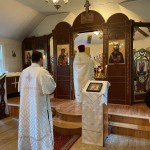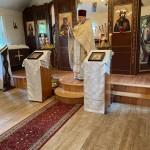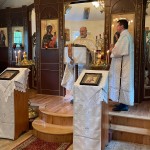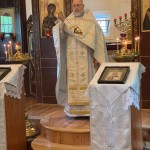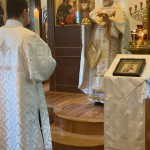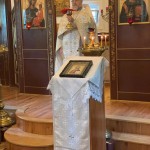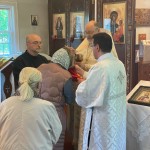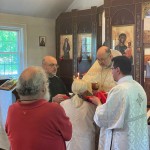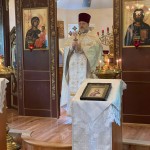On May 21, on the Sunday of the Blind Man, as well as feast of the Holy Apostle and Evangelist John the Theologian, Rector of St. George Church, Archpriest Igor Tarasov performed the Divine Liturgy in our parish temple. After the reading from the Holy Gospel he preached the following homily:
“Dear brothers and sisters in Christ, Christ is risen!Today is the last Sunday of our Paschal celebration, and on this day the Church offers us a Gospel story about a healing of the man who was born blind. It was a great and unrepeatable miracle because, as the Gospel today says, “since the world began it has been unheard of that anyone opened the eyes of one who was born blind” (Jn. 9, 32). Yet the people who witnessed such a great miracle, instead of marveling and coming to believe in Christ, began the whole investigation to find out how the eyes of the blind man were opened. Today’s pretty long Gospel lesson is telling us about that. This happened because many of the Jews were not ready to embrace the New Testament of our Lord Jesus Christ. Only some of them who became the Disciples of Christ, His Holy Apostles, did accept the Messiah. Among those Apostles was St. John the Theologian who wrote the Gospel the passage of which we heard today, and whose memory we celebrate on this day”.
“But even the Disciples of Christ when they saw the man blind from birth, asked their Teacher, “Rabbi, who sinned, this man or his parents, that he was born blind?” (Jn. 9, 2). They did so because they were living by the Old Testament understanding of God who is a zealous and vengeful Lord punishing those who offend Him. Their understanding of God was limited and simplistic, colored by fear, the pressures of the struggle to survive in a hostile world. Such an understanding was needed in the Old Testament times because the Jews held the right belief in one God while other nations and tribes did not. So, the true worshipers were supposed to fear mixing with others and offending the true God. But by the time of the coming of the Messiah it had to be changed. This is why Jesus challenged the common view of God as angry, vengeful and ready to punish those who sin. He teaches His Disciples that blindness of that man in today’s story is not because of sin, but blindness is an opportunity for the works of God to be revealed (Jn. 9, 3)”.
“We may also say that blindness of that man was an opportunity for the love of God to be revealed. The whole ministry of Christ was an act of unconditional love towards mankind. And each and every miracle, every healing performed by Jesus Christ was an act of His love. He came to the world to visit the corrupt, imperfect and sinful human nature. His response to human infirmity, disease and death was His love, His comfort, His healing and His own Resurrection from the dead. A man could be born blind because human nature is imperfect. But behold, Jesus came and by His love restored the sight of a man who could never have the sight. This is the understanding of God according to the New Testament: God is Love, God is the Lover of mankind. Of course, God is just and He will judge us at the end of the world, but first of all, God is loving us. This idea was especially preached and confirmed by Holy Apostle and Evangelist John whose memory we celebrate today”.
“Holy Apostle John wrote: “Beloved, let us love one another, for love is of God; and everyone who loves is born of God and knows God. He who does not love does not know God, for God is love” (1 Jn. 4, 7-8). “God is love, and he who abides in love abides in God, and God in him” (1 Jn. 4, 16). St. John also taught that to love God means to love your fellow man. “If someone says, ‘I love God’, and hates his brother, he is a liar; for he who does not love his brother whom he has seen, how can he love God whom he has not seen?” (1 Jn. 4, 21)”.
“Dear brothers and sisters! Finishing the days of our Paschal celebration, let us rejoice that Jesus Christ who was risen from the dead is the God of Love. He is not vengeful and angry master, but a loving Father who is willing to help us. Even if we suffer, our sufferings could be an opportunity to reveal the great works of God and His love. Let us follow His teaching and the thoughts of His beloved Disciple, John the Theologian, to abide in His endless and perfect love!”
The choir prayerfully performed the Exapostilarion and Aposticha of Pascha during preparation for Holy Communion.
After the dismissal of the Liturgy the Rector made the announcements, especially regarding the coming feast of the Ascension.

